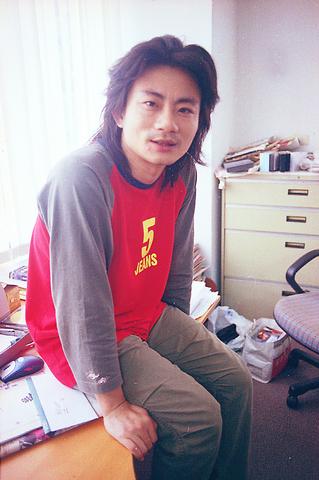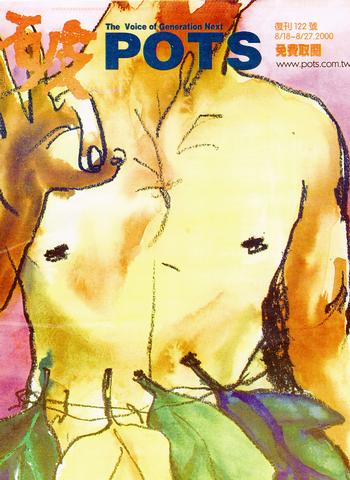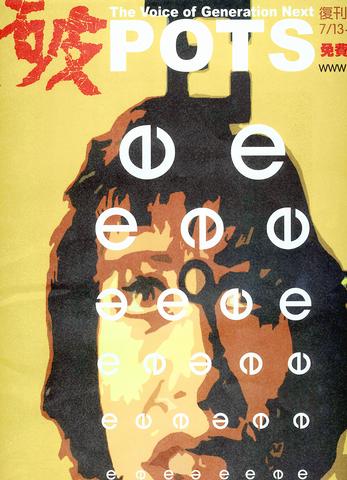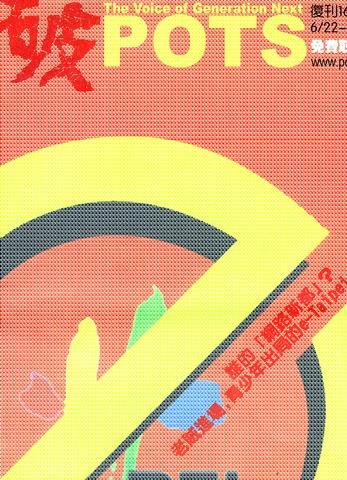First there was the article on a hundred ways to have an abortion, including a few tips on safe and cheap ways to do it yourself. Then there was the "anti-anti-drugs" (
But in stark contrast to the rest of Taiwan's vast and redundant media landscape, POTS (
Strangely, POTS' many ridiculous stands haven't caused it much trouble. What has, however, is that it is a perennial money loser, so it's forced to rely on funding from Shih Hsin University (

PHOTO: DAVID FRAZIER, TAIPEI TIMES
Next week, this funding problem might get even bigger when Shih Hsin's board of directors votes to renew the POTS budget, effectively deciding whether the weekly will survive for another year. This will take place next Monday or Tuesday.
But at POTS, this cyclical grilling is nothing new. These potentially terminal financial crises roll around every year at this time, because as its editor-in-chief Inertia Huang (黃孫權) explained, "We're not like other papers. We're on a year-to-year basis."
Recent rumors about the amount of money POTS is losing, however, have supported fears that, more than in past years, the college is really considering pulling the plug this time. It would mean an end to Taipei's only alternative journal.

On Thursday, Huang admitted that this danger had been present, but will likely be averted. As for the budget the paper is given to survive upon, however, he could only say, "We're still bargaining."
One item precariously on the bargaining table is content. When asked about it, Huang, smoking a cigarette and sitting on top of his desk, only shrugged before finally justifying his publication, saying, "you know, it's educational." An odd response perhaps, but what is even stranger, lots of people agree with him.
Arvin Cheng (

Nikita Wu (巫祈鄰), who for a year and a half has been one of POTS' three reporters in what she calls "the first steady job I ever had," said that four or five years ago "when I was in college, I was really into POTS, because for my generation, it really opened a lot of doors."
As examples, she noted POTS as the first place she ever read or heard about the alternative rock festival Spring Scream, and also as a unique and extensive source of information about drugs.
According to Huang, the tabloid "changed `Say no to drugs' into `Know how to know.'"

COUTESY POTS
"Knowledge is more important," he said, "and that's what Taiwan is lacking, whether it's the kids or the police."
Now in his thirties, Huang said he grew up as a small-time gangster, smoking glue and whatever industrial resins were handy. The information in POTS' recent reports, he said, came from a combination of his own experiences and extensive research. Now more than ever, he believes that it's important to cover drugs in Taiwan due to the trend's massive scope and rapid development.
"Now it's more and more complicated," he said. "They're mixing so many different chemicals, and it's high volume and associated with criminal behavior. I write about this a lot, because now it's not like it was for me. Back then it was more pure ... liberation, free experience ... Now it's fashion. A new drug is coming out every week. Practically every pub has its own top 10 list.
But don't get the wrong idea. POTS content isn't limited to drugs and the dark side of the cutting edge. The paper's mainstays are arts, literature, music and film. Recent issues have been devoted to topics like expatriate Filipino poets in Taiwan and activities of Hakka cultural groups. In the past, the paper has attacked local politicians for imposing curfews on those under 18 and other measures it perceives as violations of youth rights. And as one of the paper's more unique features, each issue's inside cover presents two or three dozen blurbs on everything from alternative views on hard news to subculture developments, with each item providing a Web link leading to more information on its particular topic.
To echo Huang: "it's educational."
POTS was begun in 1994 as a section in the Lih Pao Daily (
"From the beginning of the student movement we were concerned about [politics], but we found that whether you were for the KMT or the DPP you'd be disappointed. That's why we're more interested in covering social movements than political movements. So we write about student activism, labor movements and other efforts at social change rather than writing actual political criticism," Huang said.
POTS became independent from the Lih Pao Daily and was released in its present format in 1995. At that time it cost NT$30 a copy and there was no editorial hierarchy, which Huang recalled, "wasted a lot of time." Internal problems caused the paper to cease publication for a stretch of several months in 1998, but since then it has published continuously as a free weekly.
For one short stretch it was distributed in Taipei's MRT system, but after an article on Japanese S&M tours and repeated publication of nude photos came to the attention of MRT authorities, the stint quickly ended.
Throughout all of this, the paper has derived significant support from Lucy Cheng (
This means some changes may be in order. At present, POTS' circulation is mostly on or near university campuses, with a few exceptions, like distribution at Eslite bookstores.
Huang said that he's mulled broadening the paper's appeal by weeding out some of the more extreme elements and channeling them into other venues. "Advertising is getting harder and harder because of our radical viewpoint, so we might have to try to be just a little more popular in style," he said.
If the budget Huang hopes for is passed next week, the radical elements will go into 15 books POTS will begin publishing this year. Some of the volumes will consist of collated past articles, others of translated materials. In hopes of drawing more ads, the paper itself may cover topics of wider appeal and listings could be expanded.
And to generate revenue, there's also one last idea. Huang has this plan of running tours to take Taiwanese youth to music festivals and raves around the world, including Goa, Sheffield, Fuji Rock and full moon parties on Koh Pha Ngan. Like he says: "There are a lot of aspects to learning, you know. Plus, this might actually make money."
But first, Shih Hsin's board must pass POTS' budget, and that decision will come early next week.

On April 26, The Lancet published a letter from two doctors at Taichung-based China Medical University Hospital (CMUH) warning that “Taiwan’s Health Care System is on the Brink of Collapse.” The authors said that “Years of policy inaction and mismanagement of resources have led to the National Health Insurance system operating under unsustainable conditions.” The pushback was immediate. Errors in the paper were quickly identified and publicized, to discredit the authors (the hospital apologized). CNA reported that CMUH said the letter described Taiwan in 2021 as having 62 nurses per 10,000 people, when the correct number was 78 nurses per 10,000

As we live longer, our risk of cognitive impairment is increasing. How can we delay the onset of symptoms? Do we have to give up every indulgence or can small changes make a difference? We asked neurologists for tips on how to keep our brains healthy for life. TAKE CARE OF YOUR HEALTH “All of the sensible things that apply to bodily health apply to brain health,” says Suzanne O’Sullivan, a consultant in neurology at the National Hospital for Neurology and Neurosurgery in London, and the author of The Age of Diagnosis. “When you’re 20, you can get away with absolute

May 5 to May 11 What started out as friction between Taiwanese students at Taichung First High School and a Japanese head cook escalated dramatically over the first two weeks of May 1927. It began on April 30 when the cook’s wife knew that lotus starch used in that night’s dinner had rat feces in it, but failed to inform staff until the meal was already prepared. The students believed that her silence was intentional, and filed a complaint. The school’s Japanese administrators sided with the cook’s family, dismissing the students as troublemakers and clamping down on their freedoms — with

As Donald Trump’s executive order in March led to the shuttering of Voice of America (VOA) — the global broadcaster whose roots date back to the fight against Nazi propaganda — he quickly attracted support from figures not used to aligning themselves with any US administration. Trump had ordered the US Agency for Global Media, the federal agency that funds VOA and other groups promoting independent journalism overseas, to be “eliminated to the maximum extent consistent with applicable law.” The decision suddenly halted programming in 49 languages to more than 425 million people. In Moscow, Margarita Simonyan, the hardline editor-in-chief of the